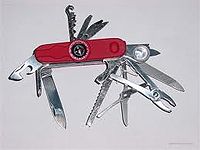In 1992, a startup company called Network Appliance (now known as NetApp) created a new category of technology product. The "appliance" was a specialized product that did one thing (in this case storing and serving files) better than general purpose machines (e.g. x86 systems that could process, store, and route data). The analogy co-founder David Hitz used with VC's when raising money was that you didn't want to make toast in an oven. The startup spawned the creation of a new class of specialized technology products that performed specific tasks such as traffic routing, security, backup, data warehousing, etc.
In general terms, this point in the history of the IT business coincided with a prolonged and fundamental movement toward best-of-breed solutions winning out over fully integrated suites of products. Competition occurred along very narrow lines (e.g. microprocessors, disk drives, PC's, Unix servers, disk systems, databases, applications, etc.), a phenomenon that created a tail wind for so-called appliances.
With the trend toward cloud computing and converged infrastructure, many are asking if the pendulum is swinging back toward more fully integrated and multi-function systems. At the September 4, 2012 Wikibon Peer Incite Research Meeting, Robert Reeder, CIO of The Rezolve Group, talked about the attributes of products that are enticing to his company. Specifically, he cited:
- A complete solution that is integrated,
- A product that can scale with his peak requirements,
- Solutions that support TRUE non-disruptive upgrades and live migration,
- Multi-function.
In particular, Reeder said that if he can do more than one task with one device it’s better, because it’s simpler to manage. Indeed, the main complaint about appliances has been they are another point of management for IT professionals and add to complexity of IT operations.
Reeder cited two examples of solutions he deployed that do more than one thing:
- Infineta’s Data Mobility Switch, which his firm is using not only to speed up inter-data center workflows, but also manage block-level replication traffic, database replication traffic, and VMware Site Recovery Manager (SRM) based traffic;
- Actifio, which offers an integrated, in-band storage virtualization solution based on IBM’s SAN Volume Controller, which allows Reeder to avoid having to buy multiple other technologies for snapshot, backup, and data protection.
Specialized appliances as a product category are not disappearing. Rather they are evolving to do more to support cloud computing that is less specialized by silo and more integrated across the application portfolio. Like multifunction printers that not only print but copy and scan, more integrated enterprise solutions are hitting the market that provide value over a wider range of the enterprise solutions stack.
Action Item: The trends toward cloud computing and converged infrastructure are evolving product solutions. Increasingly, buyers will adopt products that trade doing one thing at the very best level of performance for solutions that can offer greater integration and perform multiple functions well. Enterprise vendors, particularly startups, must remember that high quality support remains table stakes. Suppliers to the enterprise must demonstrate trained technical support staff are readily available to support these more robust products with professional that have skills sets across more disciplines. Technology can help win the deal, but support keeps it.
Footnotes:




